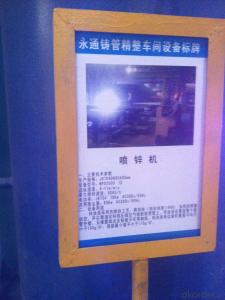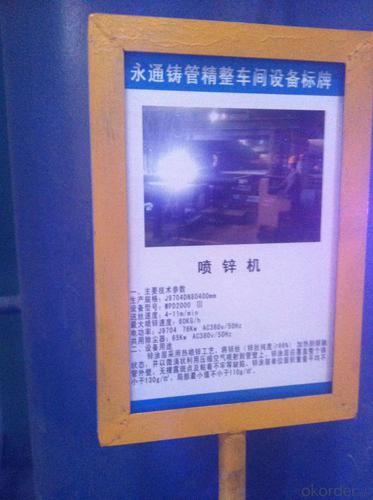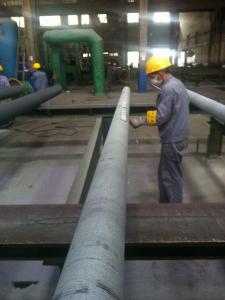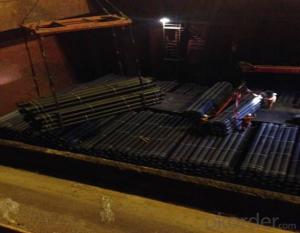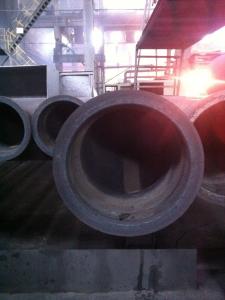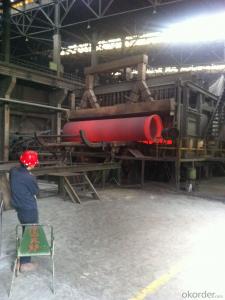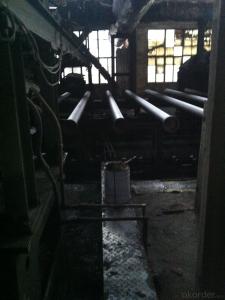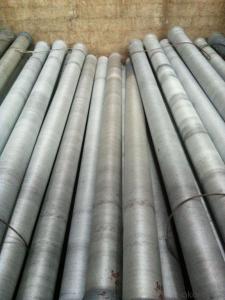DUCTILE IRON PIPES AND PIPE FITTINGS K9 CLASS DN700
- Loading Port:
- Tianjin
- Payment Terms:
- TT OR LC
- Min Order Qty:
- 22 pc
- Supply Capability:
- 3000 pc/month
OKorder Service Pledge
OKorder Financial Service
You Might Also Like
Material : Ductile Cast Iron
Size Range : DN 80mm to DN 2000mm
Unit Effective Length : 6m or 5.7m
Manufacture Standard: ISO 2531:1998/ EN 545:2006/EN 598:2007
Annual capacity : 200,000 tons
Coating Exterior: Zinc 130g/m2 according to ISO 8179-1 and bitumen coating 70 microns.
Cement Interior: Portland Cement/ High Alumina Cement/ Sulphate Resisting Cement Lining according to ISO 4179
Special requirements on external coating and internal lining can be applied
We also provide accessories such as SBR/EPDM rubber gaskets, lubricant paste, pipe caps, PE sleeves, etc.
Additional Parts:
Each pipe is strictly inspected according to related standard to ensure permanently high performance.
Easy Installation at site and service free for life
Long Service Lifespan
Quotation will arrive you within 24hours once we get your inquiry.
We guarantee offering you a competitive price.
A copy of original inspection reports of pipes will be offered after shipment.
Photos of loading process will be sent to the customer after shipment effect.
We will follow-up the delivery progress after shipment effect and update to the customer on weekly basis.
- Q: What is the expected burst pressure of ductile iron pipes?
- Several factors, including the diameter, wall thickness, and grade of ductile iron, can influence the expected burst pressure of ductile iron pipes. However, ductile iron pipes are typically designed and manufactured to withstand high-pressure loads. Typically, the expected burst pressure of ductile iron pipes ranges from 350 psi to 700 psi. It is important to note that this is a general range, and the actual burst pressure can vary depending on the specific design and manufacturing standards followed. To determine the exact expected burst pressure for a specific ductile iron pipe, it is advisable to refer to the manufacturer's specifications or relevant industry standards such as the American Water Works Association (AWWA) C150 or ISO 2531. These guidelines provide recommendations for ductile iron pipes and their performance under different conditions. Additionally, local building codes and regulations may also include specific requirements for the installation of ductile iron pipes.
- Q: Why is the sound speed of nodular cast iron lowered after heat treatment?
- After the heat treatment, the microstructure of the material changes, the graphite changes, eliminating the internal stress of molecules, thus slowing down the speed.
- Q: Can ductile iron pipes be used for both water and sewage systems?
- Ductile iron pipes can serve for both water and sewage systems, owing to their remarkable strength and durability. Renowned for their exceptional mechanical properties, these pipes can endure the immense pressure and stress encountered in such systems. Furthermore, their resistance to corrosion renders them optimal for transporting both clean water and sewage. Consequently, ductile iron pipes emerge as a dependable and adaptable option for water and sewage systems, given their wide-ranging applications.
- Q: Can ductile iron pipes be used in areas with high soil settlement?
- Yes, ductile iron pipes can be used in areas with high soil settlement. Ductile iron pipes have excellent strength and flexibility, which allows them to withstand the settlement and movement of the surrounding soil without causing significant damage or failure.
- Q: What is the expected thrust restraint method for ductile iron pipes?
- Typically, to achieve the expected thrust restraint for ductile iron pipes, mechanical joint restraints are employed. These restraints are designed to counteract the axial forces or thrust caused by the fluid pressure within the pipe. Thrust blocks, tie rods, and harness restraints are the most commonly used types of mechanical joint restraints for ductile iron pipes. Thrust blocks are concrete structures strategically placed around the pipe joints to resist the thrust forces. They are typically constructed at bends, tees, and other directional changes to prevent pipe movement. Tie rods, on the other hand, are another frequently used method of thrust restraint. These involve steel rods that are anchored to the pipe and securely fastened to an immovable structure to counter the thrust forces. Harness restraints, however, are constituted by a series of steel rods or cables that encircle the pipe and are anchored to the ground on both sides. These restraints effectively distribute the axial forces along the pipe's length, preventing movement and ensuring stability. The choice of a specific thrust restraint method for ductile iron pipes may vary depending on various factors such as pipe diameter, fluid pressure, soil conditions, and local regulations. It is vital to consult industry standards, engineering guidelines, and local authorities to determine the appropriate thrust restraint method for a particular application.
- Q: Ductile iron gears are generally treated without heat treatment
- Heat treatment must be necessary, generally annealed first to machine, after quenching or nitriding treatment
- Q: What is the expected joint deflection of ductile iron pipes?
- The expected joint deflection of ductile iron pipes depends on various factors such as the diameter, wall thickness, and type of joint used. However, in general, ductile iron pipes are designed to have a joint deflection capability of up to 5 degrees for restrained joints and up to 10 degrees for flexible joints.
- Q: Can ductile iron pipes be used for underground chemical processing systems?
- Due to their limited resistance to corrosion from various chemicals, ductile iron pipes are generally not recommended for use in underground chemical processing systems. Despite being known for their strength, durability, and flexibility, ductile iron pipes can still corrode when exposed to certain chemicals, especially those with high acidity or alkalinity. The use of ductile iron pipes in underground chemical processing systems poses a higher risk of exposure to corrosive substances that can gradually deteriorate the pipes. This deterioration can result in leaks, cracks, and failures in the piping system, compromising its integrity and potentially creating hazardous conditions. To mitigate this risk, it is advisable to consider alternative materials that offer greater resistance to corrosion in underground chemical processing systems. Stainless steel, PVC, and high-density polyethylene (HDPE) pipes are examples of materials that provide superior chemical resistance and can withstand the harsh conditions typically found in chemical processing environments. To determine the most suitable materials for underground chemical processing systems, it is essential to consult experts in chemical engineering, piping design, and corrosion resistance. The proper selection of materials is crucial for ensuring the longevity and safety of the piping infrastructure in such environments.
- Q: Can ductile iron pipe be used for agricultural irrigation systems?
- Yes, ductile iron pipe can be used for agricultural irrigation systems. It is a strong and durable material that can withstand the high pressures and corrosive environments often found in agricultural irrigation systems. Additionally, ductile iron pipe has excellent resistance to external loads and impact, making it suitable for various soil conditions in agricultural fields.
- Q: Can ductile iron pipes be used in mining applications?
- Ductile iron pipes are well-suited for incorporation into mining applications due to their exceptional strength and durability. Renowned for their ability to withstand rigorous environments, such as mines, ductile iron pipes offer excellent resistance to corrosion, a crucial characteristic when dealing with water or liquids that may contain chemicals or minerals. Furthermore, these pipes possess commendable impact resistance, enabling them to endure the harsh conditions commonly encountered in mining operations. Their ease of installation and maintenance further contribute to their efficiency and cost-effectiveness in mining applications. All in all, ductile iron pipes are a dependable choice for the transportation of water, slurry, or other substances within mining operations.
Send your message to us
DUCTILE IRON PIPES AND PIPE FITTINGS K9 CLASS DN700
- Loading Port:
- Tianjin
- Payment Terms:
- TT OR LC
- Min Order Qty:
- 22 pc
- Supply Capability:
- 3000 pc/month
OKorder Service Pledge
OKorder Financial Service
Similar products
Hot products
Hot Searches
Related keywords
